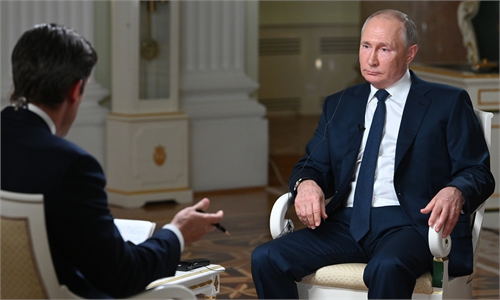Money at the heart of international efforts to save nature
Geneva meeting tackles financing

A man uses a pressure washer on Tuesday to clean the low wall surrounding the "Villa La Grange," possible venue of the meeting between US President Joe Biden and Russian President Vladimir Putin in Geneva, Switzerland. Biden and Putin are set to meet in Geneva on June 16 in their first presidential encounter. Photo: AFP
Can humanity curb spending that harms the world's biodiversity and instead focus funding on protecting it? That question is at the heart of international negotiations in Geneva.
Almost 200 countries are due to adopt a global framework in 2022 to safeguard nature by mid-century from the destruction wrought by humanity, with a key milestone of 30 percent protected by 2030.
These ambitions will only be met with a new approach to biodiversity funding and a rethink of the huge sums spent on subsidies harmful to nature, according to observers.
Subsidies for things like fossil fuels, agriculture and fishing can often result in environmental destruction and encourage unsustainable levels of production, experts say.
The exact figure that the world spends on these harmful subsidies is debated, although the group Business for Nature estimates that it could be as much as $1.8 trillion every year, or 2 percent of global gross domestic product.
Financing in general is among the more challenging issues up for debate at the Geneva meeting of the Convention on Biological Diversity (CBD), which runs until Tuesday.
"Resource mobilization at this meeting has become a thorny issue," said Ghanaian academic Alfred Oteng-Yeboah, who has played a key role in international efforts to protect biodiversity.
"It is a balancing act. At the global level money has continuously been a problem."
The draft text contains the aim "to redirect, reallocate, reform or eliminate harmful incentives," reducing them by at least 500 billion dollars a year.
It also includes a goal of increasing total finance from all sources to at least $200 billion a year by 2030 and increasing international money that goes to developing countries by at least $10 billion per year.
In 2021, a study by groups including The Nature Conservancy and the Paulson Institute estimated that in 2019, the world spent between $124 and $143 billion per year on activities that benefit nature.
But they said the amount needed by 2030 should be up to $967 billion per year, which could include refocusing funding for harmful subsidies.
Vinod Mathur, president of the National Biodiversity Authority of India, is calling for $100 billion every year in additional funding.
"There has to be substantial funding, not just peanuts. It should be new funding, or additional funding and it should be timely," he told AFP.
Without it, developing countries say ambitious conservation targets will be impossible to achieve, a real concern given the world has missed nearly all of its biodiversity targets so far.
Rich countries "recognize that there are additional efforts to be made," according to one representative, although they took issue with the developing countries' estimates of funding needed.
AFP


